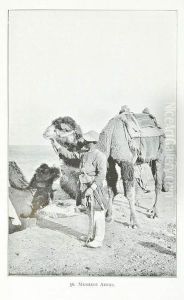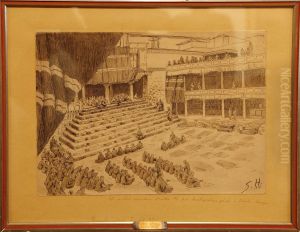Sven Hedin Paintings
Sven Anders Hedin was a Swedish geographer, topographer, explorer, photographer, travel writer, and illustrator of his own works. Born on February 19, 1865, in Stockholm, Sweden, Hedin was not just an explorer but also a significant figure in the study of Central Asia during a time when much of the region was largely unknown to Europeans. Over the course of his life, Hedin embarked on several major expeditions into Central Asia, mapping and documenting vast areas of the Asian continent that were previously uncharted by Western explorers.
Hedin's explorations began in earnest in the 1890s, with his first expedition taking him through Persia (modern-day Iran) to the Pamir Mountains. His subsequent expeditions, carried out over the next few decades, saw him traverse the deserts of Taklamakan and Gobi, discover the Transhimalaya (now known as the Kailas Range), and map the sources of the Indus, Brahmaputra, and Sutlej Rivers, among other significant geographical and scientific achievements. Hedin's work was pioneering in the field of Central Asian geography and contributed significantly to the European understanding of these remote areas.
Hedin was also a prolific writer, documenting his travels in numerous books and articles that captivated the imagination of the public and the scientific community alike. His detailed maps and comprehensive descriptions of Central Asian topography, culture, and history were invaluable to scholars. Despite the scientific nature of his expeditions, Hedin's adventures were not without controversy, including allegations of spying and his political sympathies during World War II. Nevertheless, his contributions to the exploration and understanding of Central Asia remain undisputed.
Hedin's later years were dedicated to writing and lecturing, sharing the knowledge and experiences he had gathered during his explorations. He was honored with numerous awards and accolades throughout his career, including memberships in various scientific societies across Europe. Sven Hedin passed away on November 26, 1952, in Stockholm, leaving behind a legacy as one of the last great explorers of the age of terrestrial discovery. His extensive work not only expanded the geographic knowledge of Central Asia but also contributed to the fields of geography, cartography, and ethnography.

